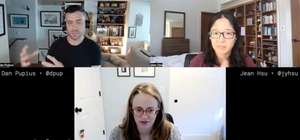In this episode of Lead Time Chats, Jean Hsu, VP of Engineering at Range, chats with Fred Plais, CEO at Platform.sh, about setting up a globally distributed team for success.
Fred and Jean discuss:
- The many advantages of hiring a globally distributed team, including round-the-clock support all during office hours
- The importance of spending limited synchronous time very intentionally
- Limiting individual teams to 2 timezones (i.e. Europe and America) to maximize team overlap
- How a globally distributed team empowers Platform.sh to build a product that’s used globally
Takeaways from Fred
Create a balance between asynchronous versus synchronous time
“We're trying to optimize for that asynchronous versus synchronous time, just get the right balance between the two. What really helps is, make sure that synchronous time is used to just communicate, troubleshoot, coordinate, make sure that people are in line with targets and objectives, so this is the time where people wanna talk and a lot of time, it's via zoom and video calls. That time is really reserved for that sort of interactions. Now we also try to make things as asynchronous as possible. It starts with recording meetings for people that cannot attend. That's a great practice. We encourage that a lot. We also have clear, good practices on how to use Slack. One simple example, you don't go to slack and say, hi and wait. Have a question, you say hi, then you ask your question and then you hit enter, and this answer may come within minutes, it may come within hours, it's okay.”
Make time to meet your team in person on a recurring basis
“I think it's very hard to create without having physical interactions. So team meetings are really a necessary compliment to anything can do online and there's a ton you can do online. You can build a relationship online, you can create trust, but I think, physical meetups are really necessary from time to time. Some team members can feel very lonely sometimes. You don't get to the office, you don't get the social excitement, and some love it, some more introvert people would absolutely trade nothing against being able to work from home and be really focused and this has a lot of pros, but it's not the case for everybody. You wanna find the right balance as well on how frequently you meet as a team, and we're doing that. Every manager has the ability to actually gather his or her team at least two times a year. Plus we've got a all-hands with all employees that we want to resume 'cuz we used to do that before the pandemic and the pandemic just broke everything. But after the pandemic, we are going to go back to that one week where we gather the entire team.”
Be present and proactive during synchronous time with your team
“I think the part which is inflexible is obviously the synchronous part of the day where you can't get around the time zone constraints and so that's when you need to be available for the team, whether you are a contributor or you are a manager, this is the time where you spend time with the team. And it's several hours in a day, but for the rest then things are flexible. If you get a dentist appointment, it's not a problem at all, and very few things are a problem actually. If you want to work at night or work in the morning, it doesn't change anything for the company, as long as the work is done. What we are expecting from our team members is show up on time, reports on your work, be specific on what you're doing and be reactive when you're blocked, let your manager know, and if you need help, just raise your hand. I think being communicative is requested and be proactive as well. Show up on Slack, just talk to people, just being transparent is a good thing for anybody.”
Enjoy Lead Time Chats?
Subscribe to the Lead Time Chats podcast on Apple, Spotify, or wherever you listen to podcasts, so you don’t miss any episodes.
Please leave us a rating or review on iTunes! It'll help these chats get in front of more engineers and leaders like yourself.
About Lead Time Chats
Listen in on unscripted conversations between Jean Hsu, VP of Engineering at Range and other leaders in tech to help you make remote teamwork a little bit less challenging.
Lead Time Chats is brought to you by Range. Range helps remote teams work better together — with asynchronous check-ins, integrated team-building, fewer and more effective meetings, and easy goal-tracking. When you run your team with Range, you’ll always know what’s going on — without having to be in back-to-back meetings.
Checking-in with Range creates more focus time for heads-down work, all while feeling a deeper sense of connection and belonging with your team.
To learn more about Range, you can check it out here.
Season 4 Episodes
» Episode 1: Najeeb Khan on Fostering Belonging on Remote Teams
» Episode 2: Hong Quan on Hiring for Remote Teams
» Episode 3: Jori Lallo on Working Effectively Across Timezones
» Episode 4: Suzan Bond on Navigating Conflict on Remote Teams
» Episode 5: Andy Detskas on Building an Inclusive Team
» Episode 6: Steph Mann on reinforcing values on remote teams
Season 3 Episodes
» Episode 1: Jen Kim on how startups can hire better
» Episode 2: Kate Heddleston on managing burnout on your team
» Episode 3: Jessie Duan on the Chief of Staff to CTO role
» Episode 4: Dan Na on pushing through friction
» Episode 5: Pat Kua on flavors of tech leadership
» Episode 6: Anna Sulkina on Endurance Sports and Software Engineering
Season 2 Episodes
» Episode 1: Camille Fournier on making boring plans
» Episode 2: Tess Rinearson on early career engineering managers
» Episode 3: Kim Scott on building for systemic justice
» Episode 4: Sumeet Arora on moving on from a big company
» Episode 5: Rachael Stedman on IC manager work
» Episode 6: Chris Bee on Behaviors of Effective Eng Leaders
» Episode 7: Lynne Tye on the Engineering Hiring Landscape
» Episode 8: Beau Lebens on Distributed Team Meetups
» Episode 9: Indrajit Khare on Getting Acquired by Google
» Episode 10: Jack Danger on Technical Debt
» Episode 11: Sarah Milstein on Successful Remote and Hybrid Teams
Season 1 Episodes
» Episode 1: Will Larson on the path of the senior engineer
» Episode 2: Duretti Hirpa on mentoring junior and mid-level engineers
» Episode 3: Cate Huston on working with an external coach
» Episode 4: Juan Pablo Buriticá on common eng manager mistakes
» Episode 5: Gergely Orosz on the decision to go into management
» Episode 6: Lara Hogan on leading effectively in a pandemic
» Episode 7: Kaya Thomas on common early career engineer challenges
» Episode 8: Uma Chingunde on starting a VPE role in a pandemic
» Episode 9: Katie Wilde on supporting your team's mental health
» Episode 10: Akhil Gupta on navigating uncertainty in new roles
» Episode 11: Harper Reed on giving everyone a voice in team meetings
» Episode 12: Marc Hedlund on sponsorship








